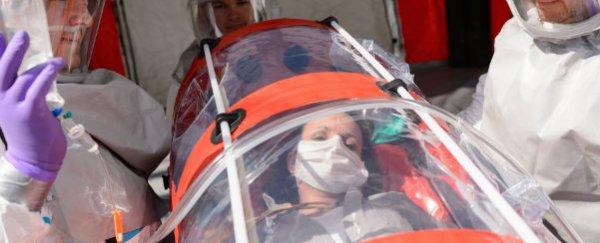A new study has suggested that the standard 21-day quarantine period that's currently being used for cases of Ebola might not be enough.
An examination of several past Ebola outbreaks has led Charles Haas, an expert in biological pathogen risk analysis at Drexel University in the UK, to suggest that Ebola patients may need to be quarantined for longer than the World Health Organisation's recommended 21-day period.
Publishing in the journal PLOS: Outbreaks, Haas analysed past Ebola outbreaks to trace the origin of the 21-day quarantine period to the 1976 Ebola outbreak in Zaire. The 21-day period was also used in the 2000 Uganda outbreak, and remains the standard procedure for the current outbreak.
But why 21 days? On what information was that specific period based? Haas could not find an answer. "Twenty-one days has been regarded as the appropriate quarantine period for holding individuals potentially exposed to Ebola virus to reduce risk of contagion, but there does not appear to be a systemic discussion of the basis for this period," he said in a press release.
But what Haas does know for sure, having looked at data from the 1995 Congo outbreak and today's resurgence, is that there's a 0.1 to 12 percent chance that an Ebola patient can manifest symptoms, even after having been quarantined for 21 days.
"Quarantine periods are meant to last long enough for a patient to manifest symptoms of a virus," says Jordan Pearson at Motherboard. "If they don't, they're likely not infected."
Because the 21-day recommendation was based on data from the 1976 outbreak alone, we now have the benefit of hindsight and a whole lot more data, Haas says, and recommends a quarantine period of 31 days instead. "While the 21-day quarantine value, currently used, may have arisen from reasonable interpretation of early outbreak data, this work suggests reconsideration is in order and that 21 days might not be sufficiently protective of public health," he concludes.
But this finding isn't an excuse for everyone to freak out about the state of the current Ebola outbreak, as Pearson emphasises in his article for Motherboard:
"The spread of Ebola in West Africa has been attributed to lapses in procedure: not enough doctors, resources, knowledge, and broken protocol. Fear mongering doesn't do anybody any good, and Haas' findings shouldn't be taken as an invitation to panic. Instead, they point to the need for rigorously followed procedures, and an equally rigorous vetting process for them."
